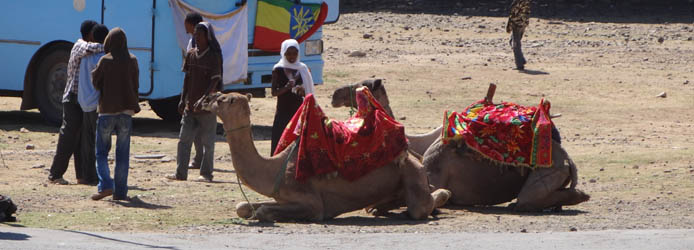Visas are required for all visitors to Ethiopia with the exceptions of nationals of Sudan and Kenya.
Passengers in transit in Ethiopia, holding confirmed onward bookings within 72 hours, can obtain transit visas.
(1) Visas are readily available from Ethiopian Diplomatic missions abroad.
The requirements for a visa are a passport valid for more than 6 months, a yellow fever vaccine, two recent color passport size photographs,
a completed Visa Application Form, and a fee (please be sure to check this in case of changes). The payment should be made in money
order or equivalent currency payable to the Ethiopian Embassy or Consulat.
Visa processing normally takes two to three working days provided all requirements are complete.
The visa issued is valid for entry within ninety days from the date of issue.
(2) Visa is also given upon arrival at the Bole Airport in Addis Ababa.
Be sure to be properly insured while you are in Ethiopia. Many insurance companies have very cheap offers for short-term travelers.
Up on arrival at the airport in Ethiopia, you must declare any foreign currency above 2,000 US$ to the customs authority.
It is recommended that you see your doctor four to six weeks before your trip to allow time for the following vaccinations.
(1) Yellow Fever vaccination is required to enter Ethiopia!
(2) Hepatitis A or Immune Globulin,
(3) Hepatitis B, if you might be exposed to blood, have sexual contact with the
local population, stay longer than six months, or be exposed to medical
treatment while in Ethiopia,
(4) Rabies, if you might be exposed to wild or domestic animals through your work or recreation, and
(5) Typhoid.
(6) Moreover, a one-time dose of Polio vaccine is recommended for adults.
(7) As needed, doses for tetanus-diphtheria and measles should be administered.
A first aid kit is highly recommended. Make sure it includes general pain killers, anti-diarrhea medicine and medicine for stomach ache (just in case). And be sure to bring any personal prescription medication to last during your trip - as well as a copy of the prescription. In addition, bug spray is important. Insect repellent containing DEET (Diethyltoluamide), in 30-35% strength for adults and 6-10% for children, is recommended for areas under 2,000 meters above sea-level. Sun-block/screen is suggested as well.
Food and waterborne diseases are the number one cause of illness for travelers. Make sure your food and drinking water are safe. You can do that by boiling your drinking water or buying bottled water. Do not swim in fresh water (except in well-chlorinated swimming pools). Malaria is also a major concern in Ethiopia. You can be infected with malaria in all areas of Ethiopia except Addis Ababa and the highland areas above 2,500 meters.
While in Ethiopia, you should wash your hands often with soap and water especially before meals. Food is traditionally eaten by hand, without cutlery. You should drink only bottled or boiled water, or carbonated (bubbly) drinks in cans or bottles. Avoid tap water, fountain drinks, and ice cubes. If this is not possible, make water safer by both filtering and adding iodine tablets to the filtered water. The appropriate filters can be found in many camping or outdoor supply stores.
Protect yourself from insects by remaining in well-screened areas, using repellents (applied sparingly at 4- to 8-hour intervals) and dress appropriately.
Warm clothing is essential throughout the year in the highland regions. You may wish to bring light cotton clothing
for use in the hot areas in the country. Insect repellent and appropriate clothing is very important.
A hat, sun screen and sunglasses are a must!
Camera, binoculars, hiking bag pack, swimming suit and trunks, and other such goodies you should not forget.






